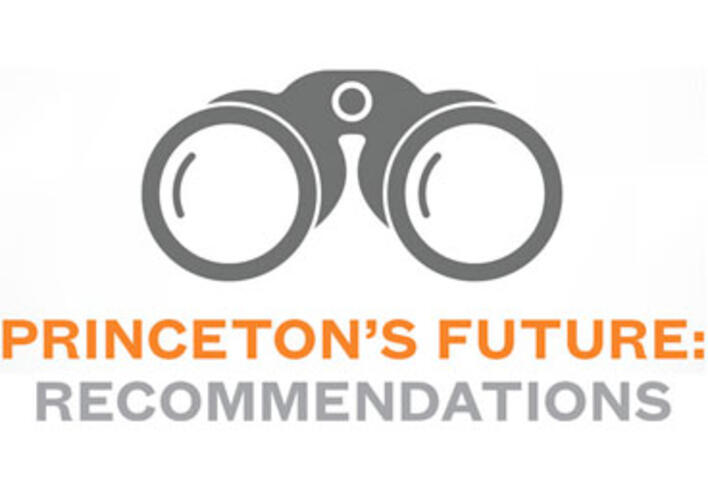As part of PAW’s continuing coverage of the work of strategic-planning task forces created by President Eisgruber ’83, this issue describes the task force report on general education.
A group charged with reviewing Princeton’s undergraduate course requirements has suggested mandating foreign-language courses for all A.B. students and requiring courses with international content and on “the intersections of culture, identity, and power.” It also recommended changing the academic calendar to allow for a January term.
The general-education task force reviewed the University’s distribution requirements, which mandate that undergraduates take courses in categories including epistemology and cognition, quantitative reasoning, and literature and the arts. The committee decided to leave the number of required courses unchanged, but said A.B. students should have more flexibility in their choices.
The new requirements for courses with international and “culture, identity, and power” content could be fulfilled within the larger categories that are already mandated, said Dean of the College Jill Dolan. For example, a course on contemporary Russian literature could fulfill the international requirement and would also be counted in the literature and the arts category.Dolan, who chaired the task force, said the proposed changes would better align Princeton with its peer institutions, many of which offer varying types of diversity-course requirements.
To create the necessary space in the academic calendar for a January term, the task force suggested moving the start of the fall semester forward by two weeks, which would allow time for final exams to be held before a two-week winter break. The proposed three-week January term would start immediately after the break, and spring semester would start the last week of January. Reunions and Commencement would also take place a week earlier than they do now.
The task force said a January term would allow students to travel, volunteer, or take a three-week course that would be structured differently than traditional classes. Participation would not be mandatory every year, but the task force said all students should participate in at least one for-credit January course. While the faculty could vote as early as next April on a new calendar, Dolan said, when it would take effect “depends on how we conceptualize and implement the [January] term that will be its centerpiece.”
Other recommendations include:
- Require all A.B. students to take at least one foreign-language course, regardless of existing proficiency.
- Encourage departments to collaborate to create “joint” or “mixed” concentrations, similar to the political-economy program in the politics and economics departments. The task force did not support the idea of a “dual concentration,” as suggested by the task force on the humanities, because requiring students to write two senior theses would result in “less investment in both fields of study.”
- Label courses with a service component within the course catalog to make them more visible to students. However, courses that focus on service and civic engagement should not be mandatory, the task force said.
- Create mandatory for-credit writing-intensive seminars for juniors to help prepare them for their junior and senior independent work.
- Encourage departments that require two junior papers to consider assigning one JP that would offer two units of credit.
- Offer interdisciplinary “Sophomore Signature” courses on social issues such as global migration or public health to help students explore potential majors.
The task force recommended against requiring all students to take a course in statistics or computer science, saying that “making such courses compulsory could counter the genuine student interest.”
The last time Princeton reviewed its general-education requirements was in 1994; the writing and science and technology requirements were modified in 2001 and 2010, respectively.













7 Responses
Stewart A. Levin ’75
8 Years AgoForeign-Language Requirements
Published online July 6, 2017
While the task force report addresses many of the outstanding issues with Princeton’s general education requirements (On the Campus, Dec. 7), I take issue with the requirement that “all A.B. students take at least one foreign-language course, regardless of existing proficiency.” I would like to see that modified by allowing those already proficient to alternatively build a significant portion of their senior thesis with references and quotations in that foreign language. In my own case, I took French at Princeton during my first two years but really didn’t learn it at all adequately until I discovered that fundamental reference for my thesis topic was a 200-plus-page, turn-of-the-20th-century math paper in French.
Robert E. “Bob” Buntrock *67
8 Years AgoNo Regrets
Back in the day, we chemistry students at the University of Minnesota were encouraged to take German and French in preparation for language exams in grad school. I did and, yes, took and passed language exams at Princeton and used my reading knowledge in reading the relevant literature. Alas, within a few years, the journals in those languages went to translating the abstracts into English and eventually the entire journal. However, I never regret taking those language courses.
Daniel Penner ’14
8 Years AgoThe Language Requirement
The language requirement at Princeton significantly changed my life for the better. I absolutely hated language classes in high school and, if given the option, would never have touched the subject again. Thankfully Princeton forced me to try, this time with the benefit of great instruction (shout-out to senior lecturer Jamie Rankin), and I’ve since discovered language learning to be a great passion of mine that has opened up opportunities and friendships around the world that I would never have discovered otherwise. Perhaps if Daniel Mytelka had opted to give it a shot, he would have discovered the beauty as well.
Daniel Mytelka ’87
9 Years AgoForeign-Language Study
One of the happiest moments at the beginning of my freshman year was when I placed out of the foreign-language requirement. I hated taking a language all through high school; I found little intellectual benefit from largely rote memorization of material in which I had no interest and little expectation of future benefit.
In my view, the language requirement is outdated. Students who want to learn a language can do so in a variety of ways, including travel, immersion classes, and online study. What is the benefit of requiring the use of limited course slots at Princeton to get an experience available elsewhere? What is the benefit of requiring proficiency in a language, rather than in other areas where a basic understanding would be of use throughout life for all students: logical thinking, literary analysis, economics, finance, statistics, medicine, law, politics, foreign affairs?
Now Princeton is considering increasing the foreign-language burden (On the Campus, Dec. 7), and I ask: Why? Who exactly is supposed to benefit? If the goal is to increase cultural awareness, a course in English would permit less siloed discussions.
Had I been forced to take such a class, I would have been completely disengaged — minimal work, minimal attendance, minimal participation, with no broadening benefit. If a class cannot attract students by being useful or interesting, it should not exist. Students will vote with their feet in choosing classes or colleges, and across many interviewed prospective students, I have yet to find a student who is interested in Princeton because of its requirements rather than its opportunities.
Peter Eubanks *07
8 Years AgoThe Language Requirement
As a Princeton Ph.D. in French literature, I was dismayed to read Daniel Mytelka ’87’s letter (Inbox, Feb. 8) in which he argues against having a foreign-language requirement at the University.
The study of foreign languages is important not only because it facilitates communication between cultures — with obvious attendant benefits for “economics, finance, statistics, medicine, law, politics, [and] foreign affairs,” the very areas which Mr. Mytelka puzzlingly claims reap no benefit from foreign language study — but also because the learning of a foreign language (or two or three) invites the student to consider new structures whereby s/he can make sense of the world.
Learning a foreign language is not merely a matter of learning what sounds to make and in what order to make them so that we can say exactly what we would say in our own tongue. No: When we learn to speak a foreign language, we actually learn to say new things, things that could not even be conceived of through the prism/prison of our native tongue, things that widen our perspective and expand our horizons.
This is how learning foreign languages gives us a second chance at life; it tells us that there is a different way, that not everything must be as we have always assumed or taken for granted. It opens us up to new ways of thinking, challenging the very structures underlying our thoughts and our understanding of the world.
Foreign languages, with the possibility for new and varied experience that they bring, are indeed at the very heart of what it means to be human.
Norman Ravitch *62
8 Years AgoMost students in America who...
Most students in America who take foreign languages, voluntarily or not, learn hardly enough to use them and quickly forget them. Probably they could spend class and study time on more valuable kinds of learning.
Richard Waugaman ’70
9 Years AgoWe’re all different....
We’re all different. Although I had a high score on the French College Board exam, I had only had two years of high school French, so Princeton asked me to take another semester of French grammar before I was allowed to take French lit courses. My instructor was the first person who ever told me I spoke French with a Belgian accent. No surprise—my high school French teacher (and future mother-in-law) was Belgian.
I loved taking French lit courses at Princeton. Getting to know another culture through its language and literature widens our horizons and expands our empathy. The philosophy department—my major—was kind enough to give me credit for a course I took on French Enlightenment philosophy given by the French department.
And the French department was kind enough to allow my wife—then my fiancée—to do her first year of graduate work at Princeton, before we both moved on to Duke, where she finished her Ph.D. in medieval French literature.
Thanks to my Kindle, I now read lots of books in French, simply holding down the word when I need the definition. I wish I’d had that at Princeton!